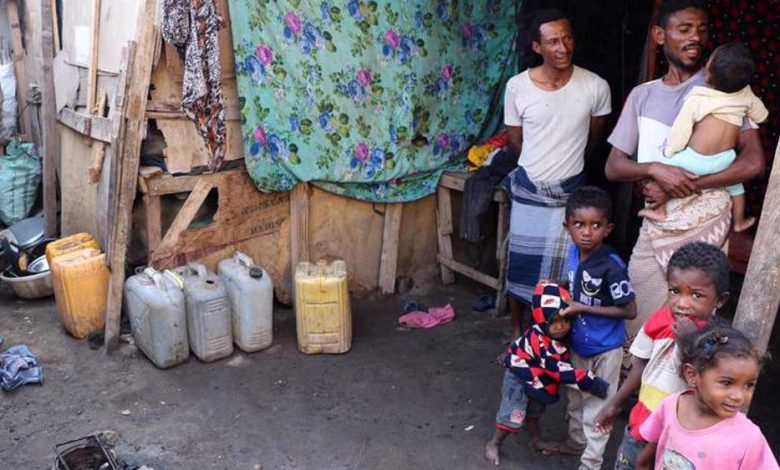Saudi-led coalition’s Yemen ceasefire ‘meaningless’ amid all-out siege: Top Ansarullah official
A senior member of Yemen’s popular Ansarullah resistance movement has dismissed the Saudi-led coalition’s announcement that it would halt military operations during the holy Muslim fasting month of Ramadan, stating that the measure is utterly meaningless as long as the brutal siege against the impoverished country is in full effect.

“The Yemen blockade is considered a military action because it was imposed by force of arms. If the siege is not lifted, the coalition’s announcement of the cessation of military operations will be meaningless,” Mohammed al-Bukhaiti, a member of Ansarullah’s political bureau, wrote in a post published on his Twitter page on Wednesday.
He added, “The suffering of the Yemenis as a result of the [Saudi-led] blockade is more severe than the war itself. This means the continuation of Yemeni military operations aimed at breaking the siege.”
Late on Tuesday, the Saudi-led coalition announced a ceasefire and said it would take effect as of Wednesday morning.
“The joint forces command of the coalition announces a halt of military operations in Yemen beginning at 6 a.m. local time (0300 GMT) Wednesday, March 30, 2022,” Saudi state news agency SPA reported, citing a statement from the coalition’s spokesman Brigadier General Turki al-Malki.
This “coincides with the launch of Yemeni-Yemeni consultations [in Riyadh] with the aim of creating the appropriate conditions for their success and creating a positive environment during the holy month of Ramadan for peace making in Yemen,” it added.
Ansarullah has shunned the meeting in Riyadh that is hosted by the Persian Gulf Cooperation Council and involves representatives from the Saudi-backed administration of Yemen’s fugitive former president, Abd Rabbuh Mansur Hadi as well as US Special Envoy for Yemen Tim Lenderking. The Yemeni resistance movement says it won’t travel to enemy territory for talks.
The Saudi-led coalition’s truce came after Ansarullah chief urged the Riyadh regime to seize on his group’s ceasefire to immediately stop its aerial attacks and crippling siege against Yemen.
“There is no chance for the countries waging aggression against Yemen to escape our retaliatory attacks, and get out of the current predicament unless they end the onslaught, lift the all-out blockade and end occupation,” Houthi said on Monday evening.
The Ansarullah chief warned the Saudi-led coalition against losing the opportunity provided by the three-day truce, calling on Saudi Arabia and its allies to agree to a permanent ceasefire. “You will be regretful if you miss the chance,” Houthi stressed.
Chairman of Yemen’s Supreme Political Council Mahdi al-Mashat on Saturday evening announced the suspension of retaliatory missile and drone attacks and all military actions against Saudi Arabia for a period of three days.
“This is a sincere invitation and practical step to rebuild trust and take all the sides from the arena of talks to the arena of acts,” Mashat said.
“And we are ready to turn this declaration into a final and permanent commitment in the event that Saudi Arabia commits to ending the siege and stopping its raids on Yemen once and for all,” he added.
According to the United Nations data, four fuel ships are waiting off Yemen’s strategic western Hudaydah port, including a tanker impounded by the Saudi-led alliance for nearly three months. Sana’a airport has been closed since 2015 as well.
Ansarullah says it won’t host ‘incompetent’ UN envoy in Sana’a
Meanwhile, Mashat stated on Tuesday that the Sana’a-based National Salvation Government would not welcome the UN Special Envoy for Yemen, Hans Grundberg.
“It is difficult for members of Yemen’s Supreme Political Council as well as Ansarullah officials to welcome the envoys, who are unable to secure the entry of a single fuel ship into conflict-stricken areas. The UN envoy has exhibited his helplessness in other issues as well,” he pointed out.
Saudi Arabia launched the devastating war against Yemen in March 2015 in collaboration with a number of its allies, chief among them the UAE, and with arms and logistics support from the US and several Western states.
The objective was to bring back to power the former Riyadh-backed regime and crush the popular Ansarullah resistance movement, which has been running state affairs in the absence of an effective government in Yemen.
The war has stopped well short of all of its goals, despite killing hundreds of thousands of Yemenis and turning the entire country into the scene of the world’s worst humanitarian crisis.







